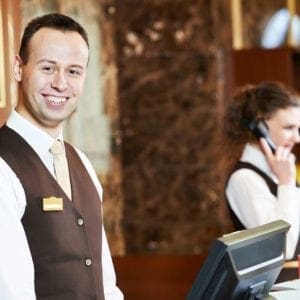 Anyone who has met me knows how crazy I am for my dog Hondo, a 125-pound bouvier des flandres puppy. We rescued him from an owner in Pennsylvania who didn’t realize that he was going to get to a size that is bordering on unmanageable. Hondo is not our first dog; he is our third. And each one is unique in its approach to life. Hondo is quite a character – pet friendly is an understatement!
Anyone who has met me knows how crazy I am for my dog Hondo, a 125-pound bouvier des flandres puppy. We rescued him from an owner in Pennsylvania who didn’t realize that he was going to get to a size that is bordering on unmanageable. Hondo is not our first dog; he is our third. And each one is unique in its approach to life. Hondo is quite a character – pet friendly is an understatement!
Looking at the world from Hondo’s perspective, there is a lot that can be applied to the hotel world. In many ways, our pets can instruct us on how to effectively manage our employees and how to best treat our teams. Here are ten takeaways that relate to your job as a hotelier.
1. Pets thrive on routine.
Routine means following a set course of activity everyday. Now think of your hotel operation – routine allows staff to conduct operations efficiently, freeing up time for more difficult or unorthodox challenges. Developing a routine means that certain practices will become ‘second nature’, allowing your team to perform them on autopilot to save precious brain energy for those harder tasks. Just make sure that the routines you imbue are the right ones from the outset.
2. You can always get a trick for a treat.
With a strip of bacon or chicken chew in my hand, Hondo will perform just about any request. Whereas your team probably will not respond well to a chewy liver snack, it does not hurt to provide little extras for performance above the standard contractual remuneration.
3. Hondo loves a pat on the head with the words ‘good dog’ spoken.
Now I’m certainly not advocating patting your employees on the head, but when was the last time you said thank you or written a note to a subordinate commending them on their performance. Your words can be just as valuable to your team’s morale as a healthy month-end cheque, so choose them wisely.
4. Don’t get in between a dog and his food. Eating is serious business for Hondo.
He can ravenously mow through a whole bowl of kibble and leftovers in under a minute. And this is no different for your hungry team! A person is only as good as the meals they eat, so make sure your staff cafeteria serves nutritious food at reasonable prices. If you are having a meeting and it is planned over the lunch hour, reassure everyone that food is being brought in, and take time out to ensure everyone has an opportunity to partake.
5. Give a dog a bone and he’ll focus on it until it is fully consumed.
Think of a bone as a project. Give a great project with a deliciously satisfying reward to team members and also give them enough time to really ‘sink their teeth into it’. They will be compensated with the profound sense of accomplishment while you will get optimal results.
6. Pets need daily exercise.
Too often we spend all day working and forget that our bodies need physical work to create balance. Sitting is the new smoking, as they say. Failure to give Hondo a one hour or so walk each day (big dogs need lots of exercise) and he’ll undoubtedly get into mischief that evening. Same with us humans; we need to balance cerebral with corporeal activity.
7. Dogs will listen, but only if your commands can be understood.
In my particular case, if you say, “Walk,” “Sit,” “Stay,” or “Down,” Hondo will answer immediately. If you confuse your words, the response will not be as you expect. It’s the same when communicating with your staff. Be as clear and concise as you can.
8. Hondo loves all people.
While Hondo is elated to see me when I come home after work each day, he also lacks any sort of prejudice with those people he meets, treating everyone with a big lick to the nearest patch of available skin. I’m obviously not suggesting that we should do the same with guests on property – that would be harassment! The lesson here is simple, though. A warm greeting goes a long way to developing endearment. Treat every guest like he or she is family, and the favor will be returned with positive word of mouth and good reviews on social websites.
9. At the end of the day, dogs need a good night’s sleep.
And so do you! Studies show that on-the-job performance improves with seven hours of sleep. Plan for it. As well, know that sleep is cumulative. You cannot fully recover from five hours lost over five consecutive nights by sleeping in one morning. Get into a routine that allows your body its full allotment of shuteye and your circadian rhythm will naturally adjust to make this is a consistent aspect of your daily life. Lastly, know that diet and exercise are huge contributors to a good night’s sleep.
10. Not everyone is a dog person.
In fact, dogs are the runner up when it comes to pets by population, with cats taking the lead. When I parade my dog in front of the select few friends of mine who are cat people, I’m met with mild enthusiasm, but hardly the type that true rapport is built upon. The takeaway here is a bit more existential in that your hotel won’t be a good fit for every single traveler out there, and sometimes, no matter how hard you try, some people just won’t be all that receptive to your buoyant hotelier attitude. Never fear. Stay true to yourself. Refine your hotel’s USP and how well you appeal to a core demographic. And on the personal front, be as kind and hospitable as possible; those who appreciate your can-do attitude will like you all the more for it.
About the author
 One of the world’s most published writers in hospitality, Larry Mogelonsky is the owner of Hotel Mogel Consulting Limited and founder of LMA Communications Inc., an award-winning marketing agency based in Toronto. His experience encompasses hotel properties around the world, both branded and independent, and ranging from luxury and boutique to select-service. Larry is also a principal of Cayuga Hospitality Consultants and is on several boards for companies focused on hotel technology. His work includes three books “Are You an Ostrich or a Llama?” (2012), “Llamas Rule” (2013) and “Hotel Llama” (2015). You can reach Larry at larry@lma.ca to discuss hotel business challenges or to book speaking engagements.
One of the world’s most published writers in hospitality, Larry Mogelonsky is the owner of Hotel Mogel Consulting Limited and founder of LMA Communications Inc., an award-winning marketing agency based in Toronto. His experience encompasses hotel properties around the world, both branded and independent, and ranging from luxury and boutique to select-service. Larry is also a principal of Cayuga Hospitality Consultants and is on several boards for companies focused on hotel technology. His work includes three books “Are You an Ostrich or a Llama?” (2012), “Llamas Rule” (2013) and “Hotel Llama” (2015). You can reach Larry at larry@lma.ca to discuss hotel business challenges or to book speaking engagements.
This article may not be reproduced without the expressed permission of the author.















